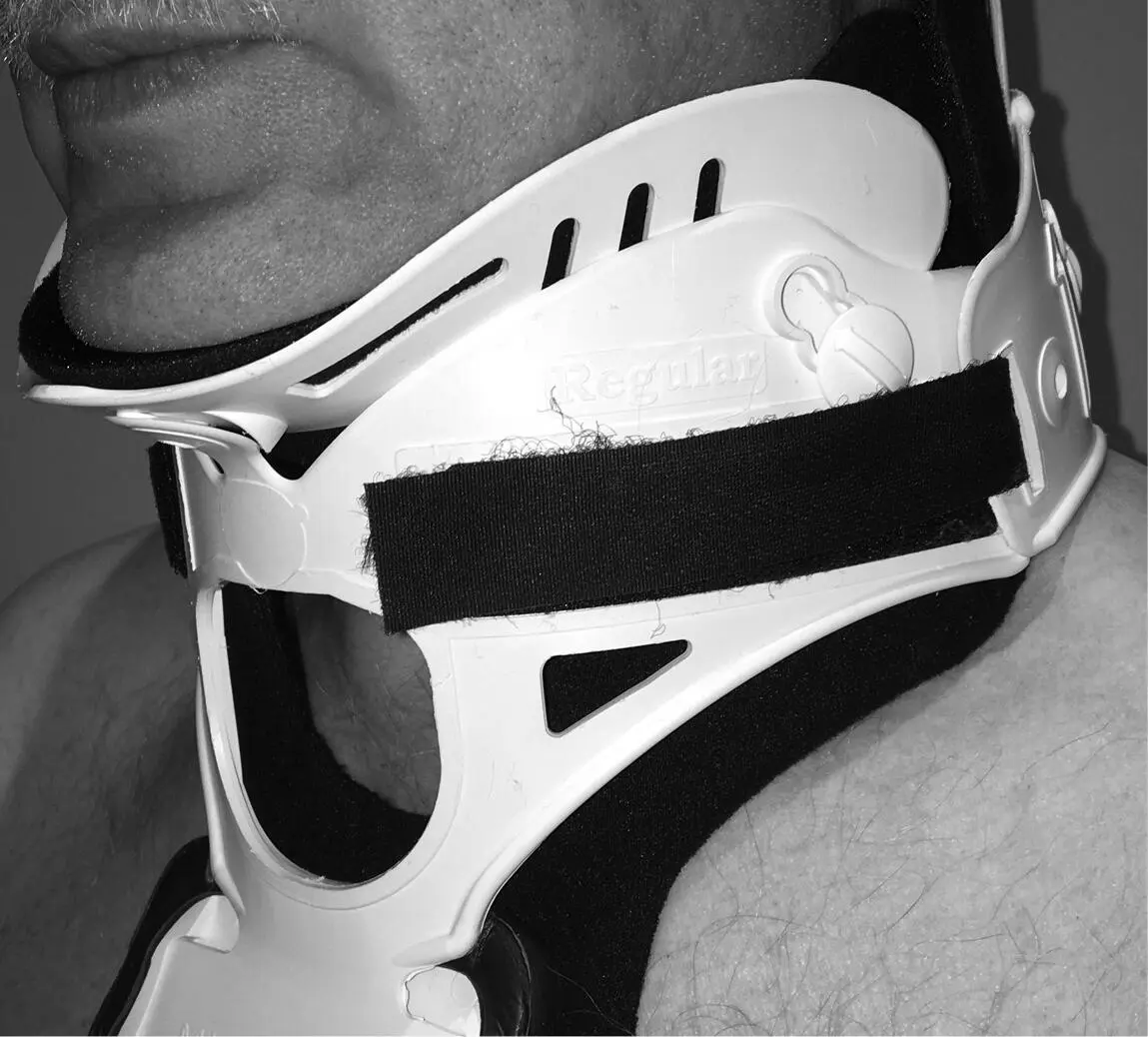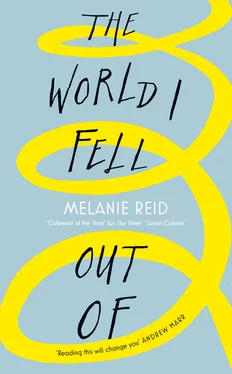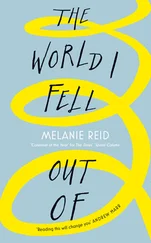‘At least I think I did,’ he said. ‘I was aff ma fucking heid at the time.’
Right outside the front door, just through the underpass, lay the streets of Govan, an inner-city Glasgow ward which persistently featured in all the indices of deprived Britain. Like urban foxes scavenging, the occasional local street dweller or small-scale drug dealer smelt out the needy patients and would drift by in the evenings, offering an anaesthetic of fags, booze, dope, pills, harder stuff. Here was an eager market; and usually with cash stowed in their zips and pockets. But nothing is successfully furtive when you cannot use your hands and slow-motion drug-dealing with cripples in the dusk was worthy of the blackest of comedy scripts. The dealers – though the name makes them sound more glamorous than they were – would hand over their booty and watch as the paraplegics, whose hands worked, fumbled in the pockets of the joggers of the tetraplegics, whose hands didn’t, to get their money out for them. That was the unwritten code with a knackered spine: anyone who had a less severe injury and could do something, helped out anyone who couldn’t. If your hands didn’t work, you found a mate whose hands did, and you locked your wheelchairs together in a macabre mating while they reached over and retrieved what you needed. For the scavengers it was a rare encounter with people far lower down the pecking order than they had ever met before.
Although the authorities alerted the police regularly to drive away the dealers, these transactions were fairly unstoppable. Anyone caught using or in possession of drugs inside the unit was expelled, and some were when I was there; but who was to ban patients from smoking outside the hospital doors? Morally, these were the entitlements of the damned. Down among any dead men – the traitor before the firing squad, the poor sod in the trenches with his torso blown away, the young paraplegic whose penis would never feel again – a cigarette was an emblem of compassion. Who would ever deny the needy whatever tiny pleasure was possible? Certainly not the occupational therapists, who would on the quiet craft ingenious devices to allow tetraplegics to continue to smoke – hand straps to let them grip fag packets, a length of wire with a loop on the end to hold the cigarette, so they could reach it to their mouths. There were no pious bleats about being forbidden to facilitate patients’ smoking, just discreet pragmatism and an absence of judgementalism. The bosses looked the other way. I loved that, even if it was just one more measure of how great a catastrophe had befallen us.
In my ward there were six beds and slowly I began to find out about the people around me. Next to me was Karen, who was the same age as me. She was a fall statistic. An innocuous tumble in her house had mysteriously paralysed her: only when she was X-rayed did she find out that she had undiagnosed arthritic deterioration in her neck which, in a stroke of appalling bad luck, had pierced her spinal column. Her injury was at a roughly similar level to mine, but I was the luckier: she had less movement in her arms than me and her fingers were permanently bent shut. If she envied me, it never showed. She never knew, either, how much I envied her calmness and realism: while I was gung-ho to fight my way back to total fitness through blood, sweat and tears, her ambitions were simply to be able to hold a mug, feed herself, and apply make-up. Guess who was the wiser?
With us in the room were two teenagers, one who had dived into the shallow end of a swimming pool on holiday, the other who had her back broken in a car accident. For months, lying listening to those kids learning their new realities, hearing them sobbing behind the thin curtains, or being taught how to catheterise themselves, or sitting their national school exams with an overwhelmed-looking adjudicator, was a profound lesson in how fortunate I was to have lived a lot of life before this happened. Later I shared a room with another little girl, and felt silent anger flare when Snapdragon, a senior nurse, insisted that her teddy bear was an infection control risk. Normally the bear would have had to go but, announced Snapdragon, glowing with the warmth of her own magnanimity, she’d make an exception as long he was kept wrapped up in a sealed plastic bag. Teddy sat there on the bedside cabinet, asphyxiated, head forced sideways, nose crushed against the plastic, pleading black button eyes, until the child went home.
In the far corner of the room was a mysterious patient who never got up: she was ensconced in a vast, high, warm sand bed, the size of a car, which shifted and vibrated constantly to heal long-term pressure sores. The bed, with its noise and warmth, had a strong presence of its own. Its occupant, an older woman, did not interact with us. Apparently her spinal injury was not new, but she had been unable to look after her skin for some years, and had developed a sore so bad she had been brought back in. Plates. The warnings resonated.
As a rule, the higher the neck injury, the more one’s hands were impacted. So every morning at 11 a.m., after our previous joyous two hours on shower chairs, us high spinal cord injury patients – the young, the old, the sporty; you might call us an elite of misfortune – congregated in the manner of elderly tortoises around the hand therapy table in our wheelchairs. Most of us wore the same severely restrictive collars, making us even more tortoise-like, so we greeted each other without full eye contact, nodding and squinting at midair, and then taking our places, waiting for our pots of hand putty to arrive. It resembled an early learning centre, but we were far more placid than toddlers. Left in peace long enough we would start to snooze, our heads drooping onto our collars.

The Miami J spinal collar, a thing of claustrophobic torture, smelling of sour milk, and worn every minute of the day for three months. That’s not me modelling it, that’s one of my mates from the spinal unit. Looking only a little bit porny.
There was Karen, wry and cheerful as ever, learning to hold her mascara brush. And Nevis, a high-flyer businessman who’d broken his neck ski-mountaineering, a silent man with the most harrowing thousand-yard stare I witnessed on anyone in the unit. Hand therapy was a misnomer for him: his hands were lifeless. Instead his arms were put in slings suspended on metal stands, the kind used to hang saline drips from, and he was trying to move his shoulders enough to be able to make them swing. If he could get enough motion, his insensate fists would brush hard enough across the pages of a magazine to turn them. The Professor was an elderly scientist who had been pulled over by his dog while out walking and broken his neck; he told whimsical, erudite stories and charmed everyone.
We had some laughs, most in very bad taste. Joker was a serial offender with velvet brown eyes and winsome long eyelashes who had broken his neck falling through a roof. He was one of the brightest people in the unit, subversive in a way that challenged common perspectives. He just didn’t care about anything or anyone. He said he quite liked having a broken neck because it meant that he got looked after.
‘I’ve been in Y— [a young offender’s institution] thirty-seven times,’ he announced one day, sitting opposite me and flapping his elbows for balance as he reached up to try to rearrange an abacus.
‘Ooo,’ I said. ‘What for?’ My tongue was sticking out with concentration. I was doing my best to play Chinese chequers with rubber bands around the wooden pegs for grip.
He looked pityingly at me, across our different worlds.
Читать дальше













